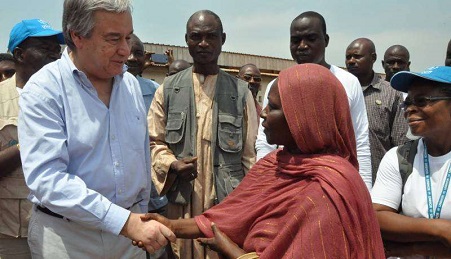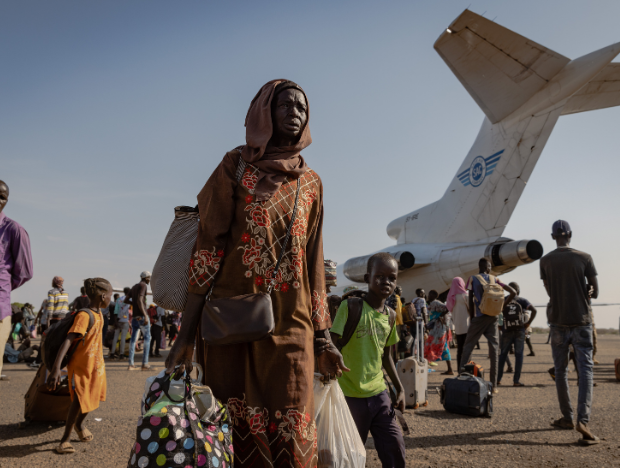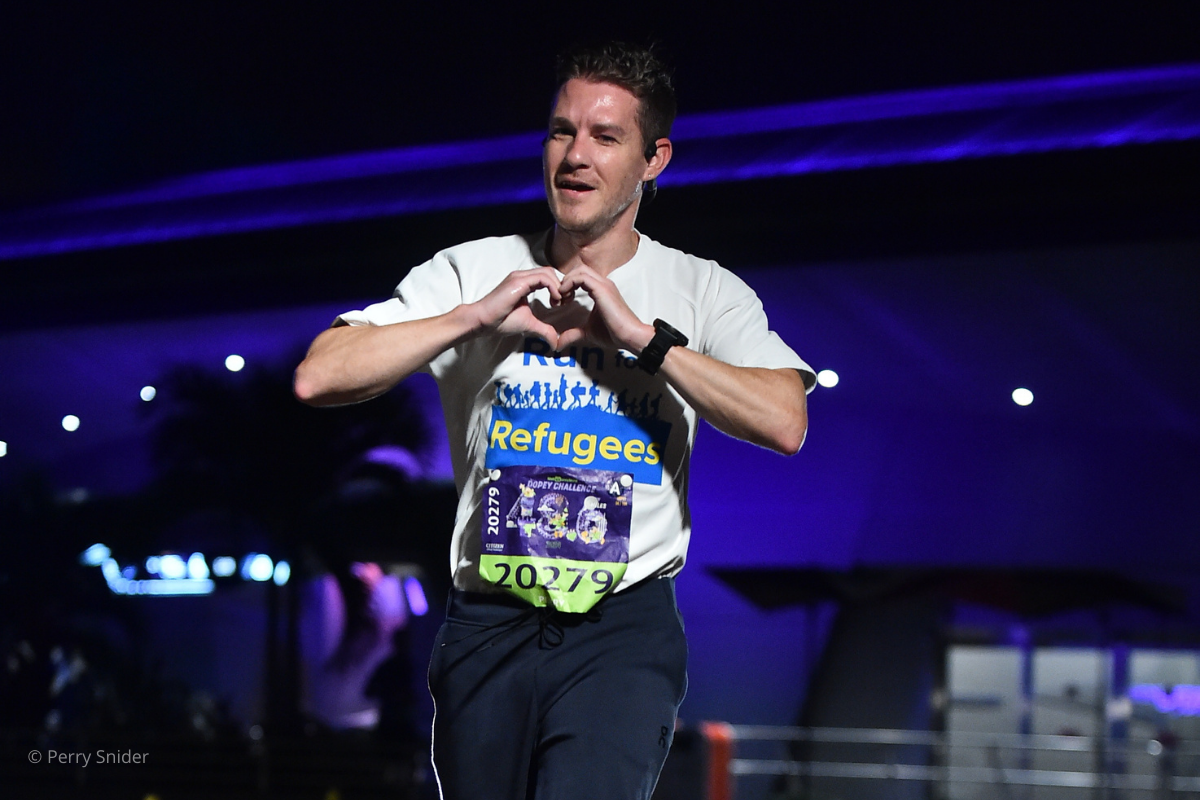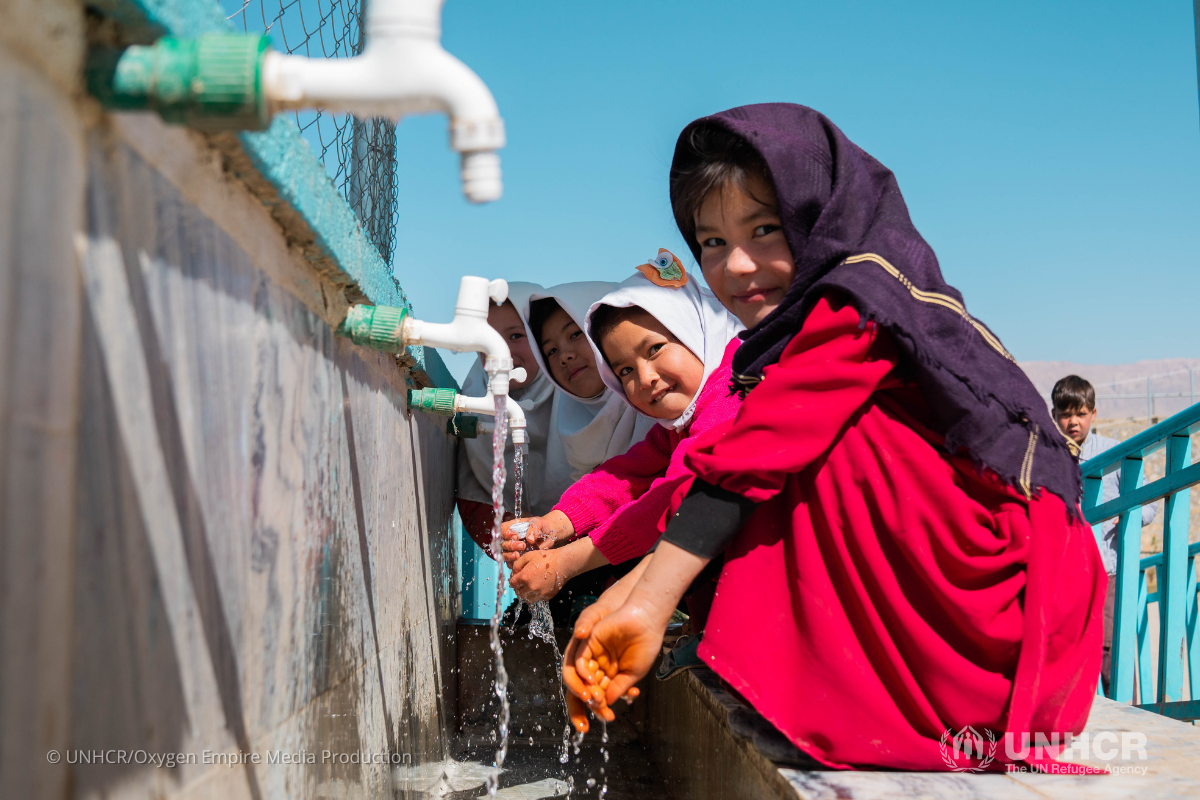UNHCR chief decries \"humanitarian catastrophe\" in CAR, including massive ethno-religious cleansing

High Commissioner António Guterres meets a forcibly displaced woman at the airport site in Bangui for internally displaced people. The Muslim woman told Guterres that she had lost everything and had no desire to remain any longer in Central African Republic. ©UNHCR/H.Reichenberger
BANGUI, Central African Republic, February 12 (UNHCR) – UN High Commissioner for Refugees António Guterres on Wednesday said he was "deeply distressed" about the situation in Central African Republic and described what he had seen during a brief visit to the country as "a humanitarian catastrophe of unspeakable proportions."
In a statement released in Bangui, he said that he was concerned because "nearly half a million Central Africans have been newly displaced [by fighting and generalized violence] since December alone. In all, 2.5 million are in desperate need." He added that "massive ethno-religious cleansing is continuing" and this was all the more tragic because of the country's centuries-old tradition of peaceful coexistence between Muslims and Christians.
Guterres, who met internally displaced Muslims and Christians in Bangui as well as repatriating Congolese, religious leaders, top government officials, international peace-keepers, diplomats and humanitarian aid partners during his 24-hour visit, called on the international community to act urgently to help build sustainable peace and stability in the Central African Republic.
"The Central African Republic is falling through the cracks of international attention. This cannot be allowed to happen. The country needs the same focus that is being put on Syria and South Sudan," said the High Commissioner, who specifically called for an increase in the number of foreign troops and police on the ground in the capital, Bangui, and other parts of the country.
The conflict in CAR escalated in December 2012, when the Seleka rebel coalition began fighting the government before capturing Bangui and ousting President François Bozizé in March last year. Months of brutality against civilians followed before wide-scale fighting erupted again in December between the predominantly Muslim Seleka and the mainly Christian Anti-Balaka militias. This was marked by attacks on people based on religion, triggering massive population displacement.
Decrying the "indiscriminate killings and massacres," Guterres noted that tens of thousands of people were fleeing to neighboring countries while others are trapped. He added that "massive ethno-religious cleansing is continuing."
The High Commissioner said that the country needed international help because although a new government had recently been formed, "it still cannot effectively protect its citizens. It is imperative to re-establish security, law and order."
In his statement and during talks on Tuesday with Christian and Muslim leaders, Guterres stressed the importance of restoring harmony. "Acting in concert, particularly with the support of religious leaders, all actors must enhance mediation and pave the way for the restoration of peace and sustainable reconciliation," he stressed.
UNHCR has been increasingly collaborating with religious leaders, who are instrumental in protecting populations at risk and fighting against religious intolerance. These same religious leaders, and a number of others, however, are now coming under threat for their actions.
On Tuesday, Guterres and France's Defence Minister Jean-Yves Le Drian opened a community night shelter in Bangui's volatile 5th District. Many people in the district stay at home during the day but feel unsafe at night and seek shelter elsewhere. This project, implemented by UNHCR partner ACTED, allows people to stay close to home and in safety.
"We are so scared to go back at night when we hear shooting and screaming. But at the same time, so tired of living in terrible conditions. We hope this center will help us find the way home," a community leader told the visitors.
Guterres then visited the vast settlement that sprang up in December at Bangui's Mpoko Airport, which now has an estimated population of about 100,000. About half of them come from the 5th District. He met members of both the Muslim and Christian communities during this visit before bidding farewell to a group of Congolese refugees waiting to cross the Oubangui River to the Democratic Republic of Congo.
At the airport, widow Zainaba said she had arrived there with her four children 10 days earlier after a terrible ordeal. "I lost everything; my home, my flesh, my identity. My kids sleep on the floor," she told Guterres. "We need your help, we need security. We live in constant fear of being killed."
The High Commissioner also met UNHCR staff and praised humanitarian aid workers for all they have done in Central African Republic under extreme circumstances. "We are all however facing dramatic underfunding. Our resources are overwhelmed and ability to do more hampered," he added, in another clear call to the donor community to step up assistance.


